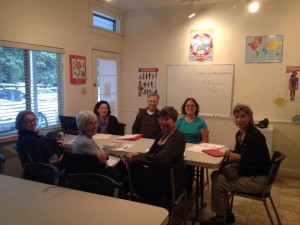Uno, dos, tres.
Rojo, azul, verde.
Alto, bajo.
Every young Spanish speaker learns the words for numbers, colors, and directions before they can even read. The adult students in Georgina Snyders’ Spanish classes got started a little later.
“I can say ‘My name is …’ and ‘I speak Spanish only a little,’” says Maryann Chwalek, a La Honda resident who enrolled in Puente’s Spanish class, taught by Snyders, this fall. Chwalek, a speech language pathologist who works with schoolchildren, helps many young people whose primary language is Spanish. Very often their parents don’t speak much English at all. So she signed up for a beginner Spanish class to gain some competency and comfort around the language.
She also loves languages in general.
“I think it’s nice to help build a bridge to another person by trying to speak their language. It’s nice to put kids at ease a little bit in their language,” adds Chwalek. “I’m just interested in languages. It’s fun.”
Puente began offering Spanish classes in La Honda two years ago, when Program Director Rita Mancera approached Snyders, a native of Chile, about teaching. Until this year, classes were limited to a small group of beginners. But this September, more than a dozen students enrolled in the 12-week class – enough, in fact, that Snyders now teaches two classes, one for beginners and one for intermediate and advanced learners.
Most students are middle aged or older, and most are women. Beginners are likely to have taken some Spanish in school, but not enough to hold a conversation, says Snyders. In these classes, conversing is the ultimate goal.
“We need to speak other languages,” says Snyders. “They are all very good students and most importantly, they have interest for study.”
Snyders is learning something new, too: how to be a teacher. Back in Chile, she was a veterinarian with an advanced degree. Now she lives on a La Honda farm alone with her husband, their fruit trees and the deer that come foraging for apples. She jumped at the chance to teach her “mother tongue” to locals. And she brings her own touches to her classes: pieces of herself, her interests, her culture.
“Sometimes I bring something from Pablo Neruda to read and talk about. Or I speak about archeology or different things,” says Snyders. That would be for the intermediate/advanced class, which will frequently converse about books or movies, or comics in the newspaper. “This is more free because the people need conversation, speaking the Spanish,” Snyders adds.
Kathleen Dickey enjoys the easy rapport Snyders brings to her intermediate/advanced class. She sometimes gets the words wrong, but never feels foolish. No one is being graded, and it’s okay to make mistakes.
Dickey loves Spanish literature and has taken Spanish classes, on and off, over decades.
But she wanted to deepen her well and feel at ease speaking the language at work. As a hospice volunteer, Dickey is asked to convey sensitive information to Spanish-speaking families. Those conversations are delicate and it’s important to be able to have them without stopping to worry about conjugating verbs, she says.
“There’s a specific vocabulary needed for those kinds of conversations. Sometimes you need to be able to explain what the doctors and nurses are telling them.
I bring my dictionary and look it up, and then I can tell them.
Then, there’s the emotional side, and that’s the same no matter what the language is,” says Dickey.
Both classes will ‘graduate’ in December, and students will receive certificates from Puente. In true Puente fashion, the graduation party will blend students of Spanish and students of English, who have been taking Spanish classes in Pescadero. It’s an opportunity to eat Mexican food and converse.
Snyders will urge her students not to be nervous about talking to strangers. “I say you speak Spanish now, practice!”
To learn more about Puente’s Spanish and English classes, contact Program Director Rita Mancera at (650) 879-1691 ext. 102 or email her.

